Faulty ice-cleaning machine blamed for carbon monoxide poisoning at Sask. hockey tournamentREPLACE IT WITH AN ELECTRIC ZAMBONI
CBCFri, November 17, 2023  Carbon monoxide emissions emitted by a faulty ice-cleaning machine are likely to blame for reported illness in a Saskatchewan hockey arena, health officials say. (Avantagesport.com - image credit)Carbon monoxide emitted by a faulty ice-cleaning machine is the likely cause of illness reported at a recent Saskatchewan hockey tournament, health officials say.No one was seriously injured in the Wakaw, Sask. arena on Sunday, but an unspecified number of people reported symptoms consistent with carbon monoxide poisoning.The furnace was initially suspected to be the problem, but the Saskatchewan Health Authority said it was likely caused by a faulty ice-cleaning machine. It's unclear whether the rink had a functioning carbon monoxide detector."Carbon monoxide, it can have quite an impact … as we saw when it does get elevated. Of course, it's an odourless gas, you can't smell it," said Ryan Philipation, senior SHA public health inspector for the region that includes Wakaw.
Carbon monoxide emissions emitted by a faulty ice-cleaning machine are likely to blame for reported illness in a Saskatchewan hockey arena, health officials say. (Avantagesport.com - image credit)Carbon monoxide emitted by a faulty ice-cleaning machine is the likely cause of illness reported at a recent Saskatchewan hockey tournament, health officials say.No one was seriously injured in the Wakaw, Sask. arena on Sunday, but an unspecified number of people reported symptoms consistent with carbon monoxide poisoning.The furnace was initially suspected to be the problem, but the Saskatchewan Health Authority said it was likely caused by a faulty ice-cleaning machine. It's unclear whether the rink had a functioning carbon monoxide detector."Carbon monoxide, it can have quite an impact … as we saw when it does get elevated. Of course, it's an odourless gas, you can't smell it," said Ryan Philipation, senior SHA public health inspector for the region that includes Wakaw.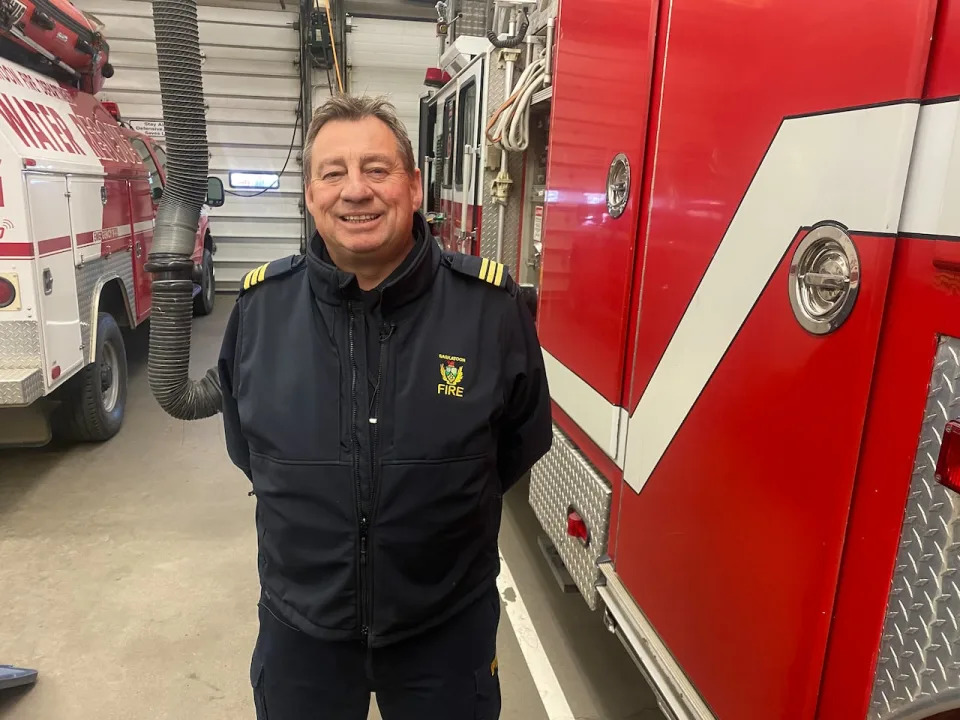 Saskatoon Fire Marshall Brian Conway says it's important to install and maintain a functioning carbon monoxide detector.Saskatoon Fire Marshall Brian Conway says it's important to install and maintain a carbon monoxide detector. (Jason Warick/CBC)He said the SHA is investigating and conducting tests. They've also provided air quality fact sheets and other educational materials.Philipation said it's helpful for rink officials across the province to test CO levels periodically. He said Wakaw officials have been very co-operative.The rink remains closed, but they hope to reopen in the coming days, he said.Saskatoon Fire Marshall Brian Conway said that with winter coming, it's vital to have a functioning CO detector and to immediately vacate any building suspected of high levels of the gas."I think people are becoming more aware, but things like this always brings it back to the forefront," Conway said."CO gas or carbon monoxide gas is a colourless, odourless gas. Realistically, you don't know you're in amongst it until things start to happen."
Saskatoon Fire Marshall Brian Conway says it's important to install and maintain a functioning carbon monoxide detector.Saskatoon Fire Marshall Brian Conway says it's important to install and maintain a carbon monoxide detector. (Jason Warick/CBC)He said the SHA is investigating and conducting tests. They've also provided air quality fact sheets and other educational materials.Philipation said it's helpful for rink officials across the province to test CO levels periodically. He said Wakaw officials have been very co-operative.The rink remains closed, but they hope to reopen in the coming days, he said.Saskatoon Fire Marshall Brian Conway said that with winter coming, it's vital to have a functioning CO detector and to immediately vacate any building suspected of high levels of the gas."I think people are becoming more aware, but things like this always brings it back to the forefront," Conway said."CO gas or carbon monoxide gas is a colourless, odourless gas. Realistically, you don't know you're in amongst it until things start to happen."
Mom of Canadian children gets 11th-hour reprieve to stay in Edmonton
CBC
Sat, November 18, 2023

Halima Abdi and her youngest son, two-year-old Mubarak. (Travis McEwan/CBC News - image credit)
For 15 long months, Edmontonian Halima Abdi fought to stay in Canada with her husband and three Canadian children.
She even went into hiding after a warrant was issued for her arrest.
Edmonton police finally caught up with Abdi in October 2022. She was arrested, briefly detained and issued a one-way ticket back to Kenya on Nov. 14th.
But Abdi never boarded the flight. Hours before take-off, a border agent called. Her removal had been cancelled.
"I was so relieved," said Abdi, 33, through smiles and tears, from her Clareview home with her sons sticking close to her side. "It was a miracle."
Abdi's journey to Canada began nearly seven years earlier when she fled extra-judicial killings of ethnic Somalis in her native Kenya, which she says claimed the life of her brother.
Canadian immigration authorities concluded Abdi's life was not at risk and rejected her refugee claim.
'Don't leave me mummy'
Of greater concern to Abdi however, was the impact her absence would have on her three sons aged two, four and five. Nearly a year after coming out of hiding, she says stepping out of the room can still set off her oldest boy.
"He's like 'where are you going mummy, don't leave me mummy'," Abdi said.
Abdi's plight drew the lobbying efforts of community and business leaders as well as the Canadian Academy of Child & Adolescent Psychiatry.
The Academy warned the federal government's approach to removal is putting the mental health of Canadian children at risk.

Halima Abdi saw her husband and sons for the first time in three months last week after she went into hiding to avoid deportation. Halima Abdi and her family in October 2023 when she came out of hiding to speak to CBC News. (Dunia Nur)
In an emailed statement, the Canadian Border Services Agency (CBSA) confirmed Abdi's removal was cancelled "after the issuance of a temporary resident permit and a work permit were authorized, ensuring she can continue to stay in the country for a period of two years, and allowing for the processing of her pending application."
The reprieve gives Abdi an opportunity to apply for permanent residency on humanitarian and compassionate grounds.
The CBSA did not address several questions posed by CBC News including whether this is a stand-alone decision or a shift in policy. The agency does not track how many Canadian children are affected by such removals.
Dunia Nur, president of the African Canadian Civic Engagement Council, said this week's decision gives her hope for other cases.
"But what scares me is there is nothing that is mandated so therefore it's the discretion of whoever is in power and to what extent they're willing to intervene," said Nur, who led advocacy efforts for Abdi.
While Abdi's dream of settling in Canada for good no longer seems out of reach, she hopes her experience can help other families in similar circumstances.
"Since Canada's main goal is to unite families — I'm begging the Canadian government not to separate families."
NEWFOUNDLAND
Residents of the tent encampment in St. John's share their hopes, fears with winter on the horizon
CBC
Sun, November 19, 2023
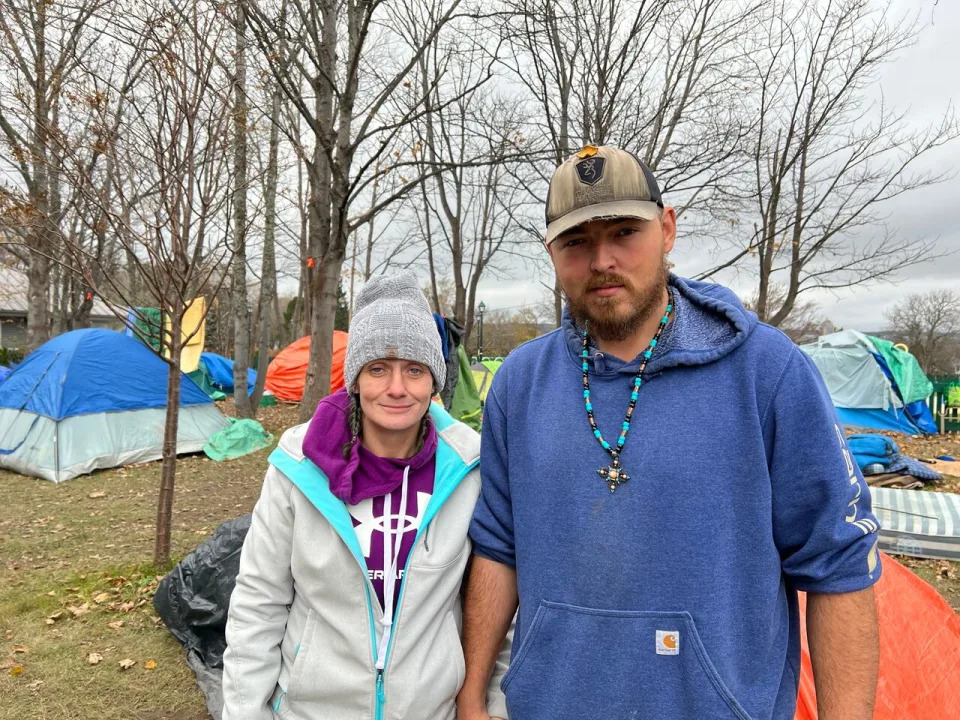
Melanie Liebrecht, left, and Brandon Poulin are pictured here in front of their tent. Liebrecht said it is freezing every night. (William Ping/ CBC News - image credit)
For some of the people sleeping in tents behind the Colonial Building in St. John's, the encampment is an instance of history repeating itself.
"In the 1800s, there was a tent city here as well because of the Great Fire," said Melanie Liebrecht, one of around 20 people currently living on the grounds near Bannerman Park.
"They didn't give up hope either," said Liebrecht. "If they can do it, we can be the modern age of them and we can succeed as well."
Though Liebrecht is trying to remain hopeful that those living in tent city will find housing before the onset of winter, it is hard for her to remain optimistic.
"This is ridiculous and we've fallen through the cracks and we've gone through enough and been promised enough and nothing follows through," said Liebrecht.
Searching for a way out
Liebrecht's husband, Brandon Poulin shared similar concerns.
"We're survivors," Poulin said, describing the people living in tents. "We've managed to become a bunch of misfits from different places in the world and we've become a family unit."
"We hold Bible study and we eat supper and we take care of each other and we take care of ourselves. And nobody goes without. And if we see that somebody's tent or tarp is falling apart, we all pitch in to help. It's become a community."
Poulin says as much as they love the people around them and the community that they have built, he wishes it were under better circumstances. "Something needs to change," he said.
"I do want to work, I'm passing out resumes every day, asking what resources are available to me to better my situation for me and my wife daily. We're no further ahead than when we first got here"
"I gotta clean myself with moist wipes, a hobo bath in the public bathroom," said Poulin.
"I have no problems with Trudeau bringing in people from other countries, war-torn countries, wherever that needs the help," Poulin said. "I'm proud to be a Canadian and and I'm proud to accept that. But at some point you have to say 'I'm sorry, I have to stop for a while because my own are suffering now, my own are on the streets now.'"
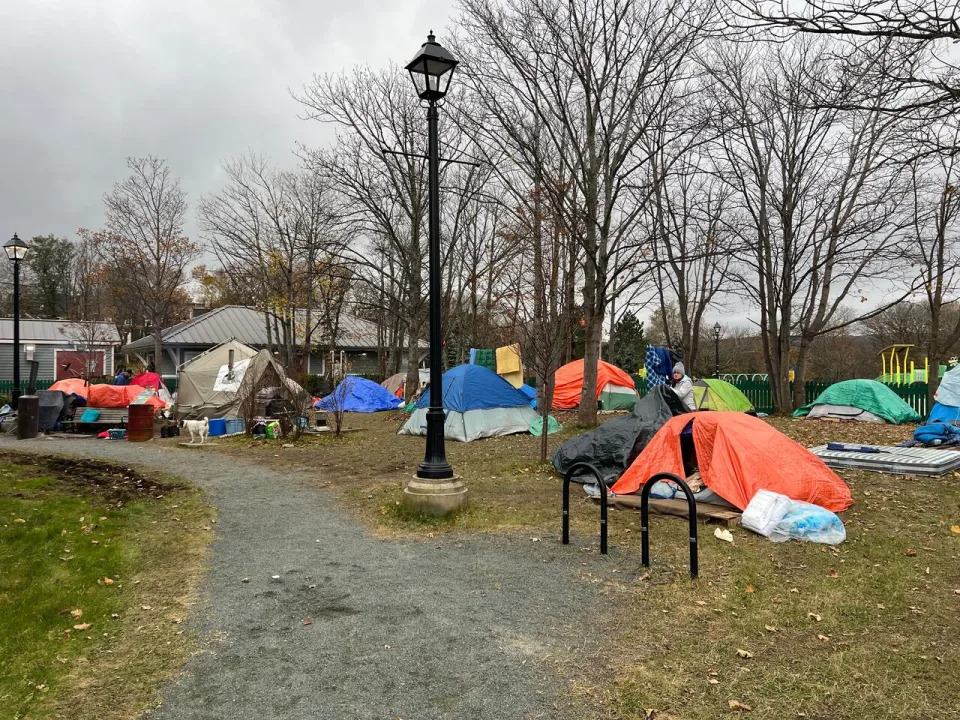
Residents of the encampment behind the Colonial Building in St. John's spent much of Saturday figuring out how to windproof their tents in advance of some rough weather predicted for Sunday. (William Ping/ CBC News)
On Saturday, many in the tent city were concerned about the rainy and windy weather in the forecast for Sunday.
"We just talked about how to organize stuff from blowing away cause we don't want it to look too messy here and make it look like we're throwing stuff all over the place," said Gregory, another person who has been living in the tents. He didn't want to share his full name with CBC News. "There's no beer cans and needles, it's pretty self-sufficient."
Gregory explained that while some people do drink alcohol and use drugs on the premises, they have been making every effort to keep the space clean and safe.
"That's the respect," Gregory said. "Everybody respects each other."
Gregory said though there have been some arguments break out among the people in the tents, staying outdoors is still preferable to the other options they have for shelter.
"A lot of people don't want to go there because there's people who robbed them or raped them or it's gonna be a fight," Gregory said. "That's the main thing here. People are together because they feel safe."
However, not everyone feels safe.
Panic attacks
Lesley Caines was packing up her tent on Saturday with the hopes that The Gathering Place would accept her.
"Violence is a big concern here," Caines said, as she recounted several recent incidents where the police had to intervene.
"There was an axe swinging around here," Caines said, describing an incident on November 14th where the Royal Newfoundland Constabulary arrested a 24 year old woman on charges including assault with a weapon and uttering threats.
"People are arguing all hours of the morning and my tent was actually broken into," Caines said. "My medication was stolen."
"I'm scared here," Caines said. "I never had panic attacks before this."
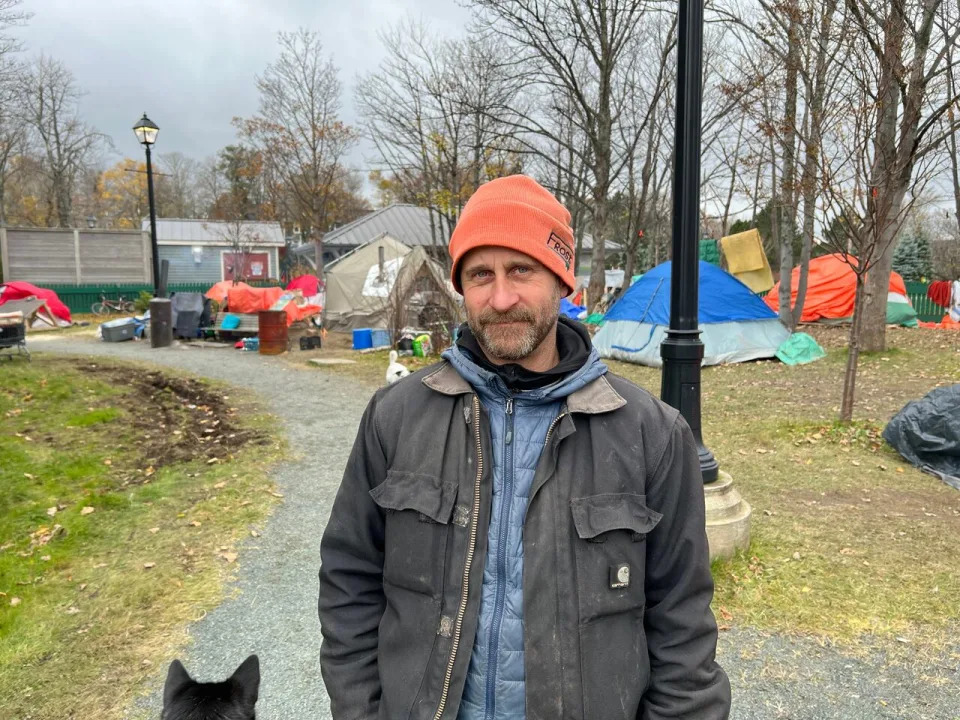
Mark Wilson is a community activist who has been volunteering at the encampment. He says the lack of government response is embarrassing.
Mark Wilson is a community activist who has been volunteering at the encampment. He says the lack of government response is embarrassing. (William Ping/ CBC News)
Mark Wilson is a community activist who has been volunteering his time to help those living in tents.
"There is a real need for government or the Red Cross to step in," Wilson said. "Volunteers are being relied on for everything here and it's simply not a good practice."
"Let's be real about this, no one wants to be living in a tent in mid to late November in Newfoundland and Labrador," Wilson said.
An embarrassing lack of response
Wilson said the lack of response from government is especially frustrating due to the number of resources owned by government in the area.
"There is no bathroom down here," Wilson said. "So why can't the city open the Bannerman Park bathroom?"
"The pool house has showers, and could be used as a warming shelter, but it's not," Wilson said.
"To think that some of this very simple low hanging fruit can't occur is just embarrassing," Wilson said. "The government has got their head in the sand or they are just unwilling to do anything to support folks that are just barely surviving."
"In Newfoundland and Labrador, we know how to get stuff done better than most places," Wilson said. "So why are we not just doing it? We need shelters."
"If this was Muskrat Falls and there were new workers coming in, they'd have those work trailers where people sleep, where they shower," Wilson said. "You just get it done so that things can happen. And that's not happening here."
Ottawa to appeal court ruling that overturned order listing plastics as toxic substance
CBC
Mon, November 20, 2023
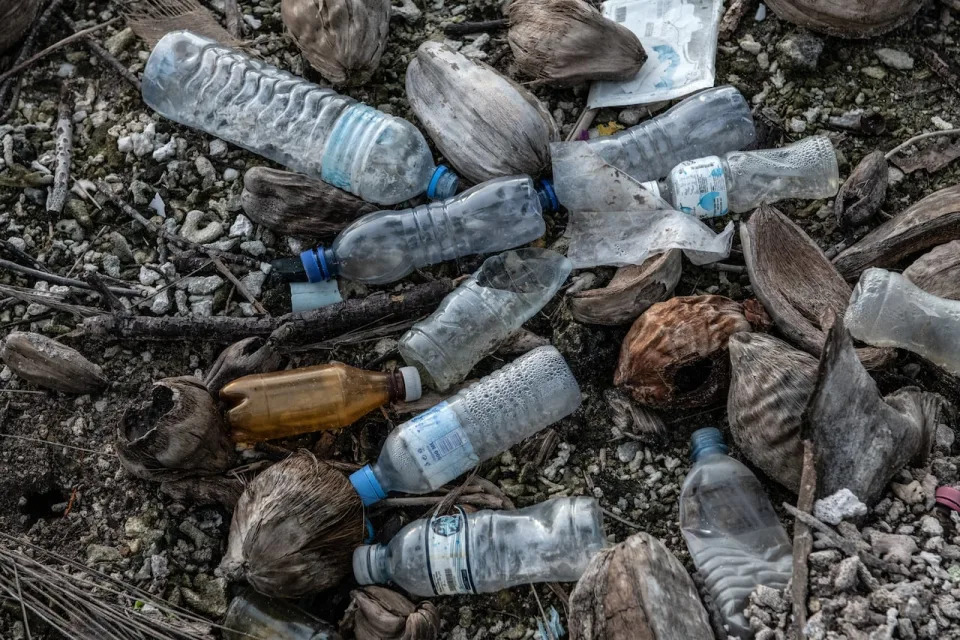
The federal government is only able to regulate substances for environmental protection if they are listed as toxic under the Canadian Environmental Protection Act. (Carl Court/Getty Images - image credit)
The federal government is planning to appeal a court decision that quashed an order-in-council listing manufactured plastic items as toxic.
Last week, a Federal Court judge ruled that the government's move to list all plastic items as toxic was "unreasonable and unconstitutional."
Environment Minister Steven Guilbeault and Justice Minister Arif Virani announced the government's intention to appeal in a joint statement on Monday.
"Our government intends to appeal the Federal Court's decision and we are exploring all options to continue leading the fight against plastic pollution," the statement says.
The move to list plastic items as toxic was a key step that allowed Ottawa to proceed with a ban on six single-use plastic items, including straws and shopping bags.
In her ruling released Thursday, Justice Angela Furlanetto wrote that the category of plastic manufactured items was too broad to be given a blanket toxicity label under federal law.
"There is no reasonable apprehension that all listed [plastic manufactured items] are harmful," Furlanetto wrote.
Speaking during an unrelated press conference on Monday, Guilbeault said the impact plastic waste has on the environment and human health is "undebatable."
"We will continue with our strategy to fight plastic pollution. We want to get plastic out of our environment, out of our neighbourhoods," he said.

Minister of Environment and Climate Change Steven Guilbeault speaks during a news conference on the implementation of stricter measures to regulate the trade of certain wildlife items, particularly elephant ivory and rhinoceros horn, in Ottawa, on Monday, Nov. 20, 2023.
Minister of Environment and Climate Change Steven Guilbeault speaks during a news conference on the implementation of stricter measures to regulate the trade of certain wildlife items, particularly elephant ivory and rhinoceros horn, in Ottawa, on Monday, Nov. 20, 2023. (Justin Tang/The Canadian Press)
Regulating waste management is generally a provincial responsibility. The government is only able to regulate substances for environmental protection if they are listed as toxic under the Canadian Environmental Protection Act.
Furlanetto wrote that Ottawa's decision "poses a threat to the balance of federalism" because it didn't restrict its regulations to those plastics that have "potential to cause harm to the environment."
The Alberta government was an intervener on the case. On Thursday, Alberta Premier Danielle Smith and her Environment Minister Rebecca Schulz urged Ottawa not to appeal Furlanetto's decision.
The case was brought forward by a group of major industrial players in plastics, including Dow Chemical, Imperial Oil and Nova Chemicals. They argued that Ottawa failed to demonstrate it had enough scientific evidence to justify the regulations.
P.E.I. to move forward with expanding its own plastics ban, says minister
CBC
Mon, November 20, 2023 at 3:00 a.m. MST·3 min read

Might wooden cutlery be in P.E.I.'s future? Environment Minister Steven Myers says he's ready to push ahead with banning more kinds of single-use plastics. (CBC - image credit)
P.E.I.'s environment minister says the province will look to expand its own single-use plastics ban now that a Federal Court of Canada judge has ruled a ban Ottawa planned to impose was "unreasonable and unconstitutional."
Prince Edward Island was the first province in Canada to ban single-use plastic bags, with a law that came into effect in July 2019.
Since then, Steven Myers said Friday, the province has been in a "holding pattern" after the federal government said it would take the lead on further reductions in single-use plastics.
In the aftermath of Thursday's ruling by Federal Court Justice Angela Furlanetto, the environment minister told the legislature P.E.I. can build "a model of sustainability for Islanders that can be mimicked across Canada.... We intend to be leaders in everything that we do on an environmental profile and we're going to look at doing something in this realm."
The Trudeau government had planned to ban the sale of single-use plastic shopping bags, cutlery, food service ware, stir sticks and straws after Dec. 20.
In order to have the power to do that, the federal government had listed the items as "toxic."

Environment Minister Steven Myers said the government will hold public consultations before expanding P.E.I.'s plastic bag ban.
Environment Minister Steven Myers said the government will hold public consultations before expanding P.E.I.'s plastic bag ban. (Aaron Adetuyi/CBC)
That led to a court challenge by a group of major industrial players in plastics, including Dow Chemical, Imperial Oil and Nova Chemicals. They argued that Ottawa had failed to demonstrate it had enough scientific evidence to justify the regulations.
'I'm talking about lifetimes and generations'
On P.E.I., Myers said he's seeking advice as to whether the province's longstanding plastic bag ban would survive a legal challenge if manufacturers launched one based on Furlanetto's ruling, which the federal government will seek to appeal in front of the Supreme Court of Canada.
Ashley Wallis is associate director of Environmental Defence, which was an intervenor in the federal case. On Monday, she said P.E.I.'s ban shouldn't be in extra jeopardy because of the Federal Court decision.
"This [federal] case doesn't really speak to provincial jurisdiction to implement bans on specific products or product categories," Wallis said, adding that because of the Trudeau government's ban being delayed, "There's a real gap here and an opportunity for provinces and municipalities to kind of step up in the interim."
Born 15 years ago
The P.E.I. bag ban was brought forward in a private member's bill introduced by former Liberal MLA Allen Roach in 2018.
As for expanding it to include other single-use plastic items, Myers said the province intends to move quickly but will hold public consultations.
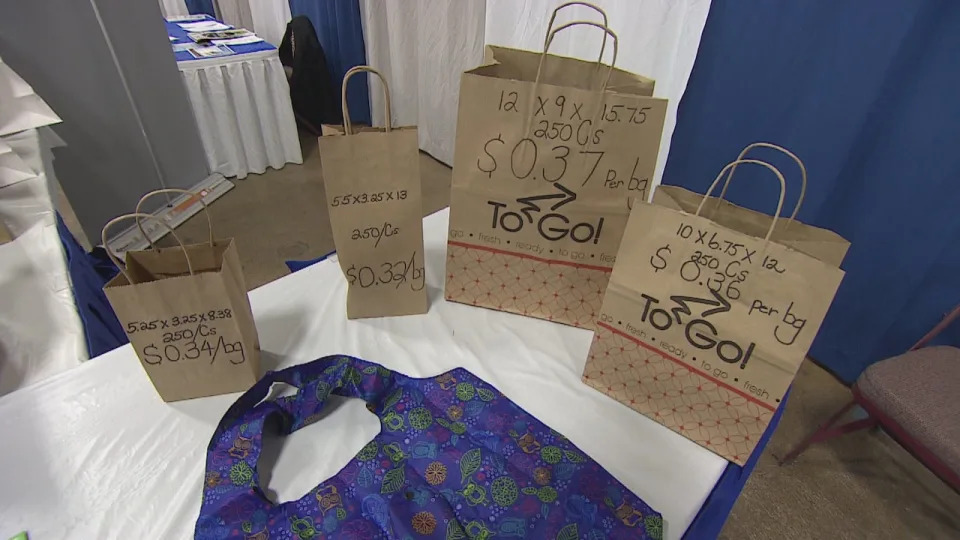
Green says how to store the paper and reusable bags is one of the biggest challenges facing many P.E.I. businesses because the plastic bags took up less space.
Island businesses started packing people's purchases into paper and reusable bags after the plastic bag ban took effect on July 1, 2019. (Shane Hennessey/CBC)
"I hear a lot of complaints about the paper straws and I would say they're probably less than adequate when it comes to straws," the environment minister told reporters Friday.
"But I think at the same time we have to have some recognition that the things that we use have further impacts that are outside of our lives…I'm not talking about 10 years or five years, I'm talking about lifetimes and generations.
"I know eating with a wooden fork isn't as good as eating with a plastic fork, but if that's the inconvenience that you're going to be stuck with, I'm okay with delivering that."
Progressive Conservative backbench MLA Zack Bell raised the issue of the ban in the legislature Friday.
He said while many Islanders support banning single-use plastics, "critics say the replacement products are of a lesser quality, they pose difficulties for seniors and people who are not able-bodied, and they also add extra costs for businesses here on the Island."
Research underway aiming to make wildfire evacuations smoother
CBC
Sun, November 19, 2023
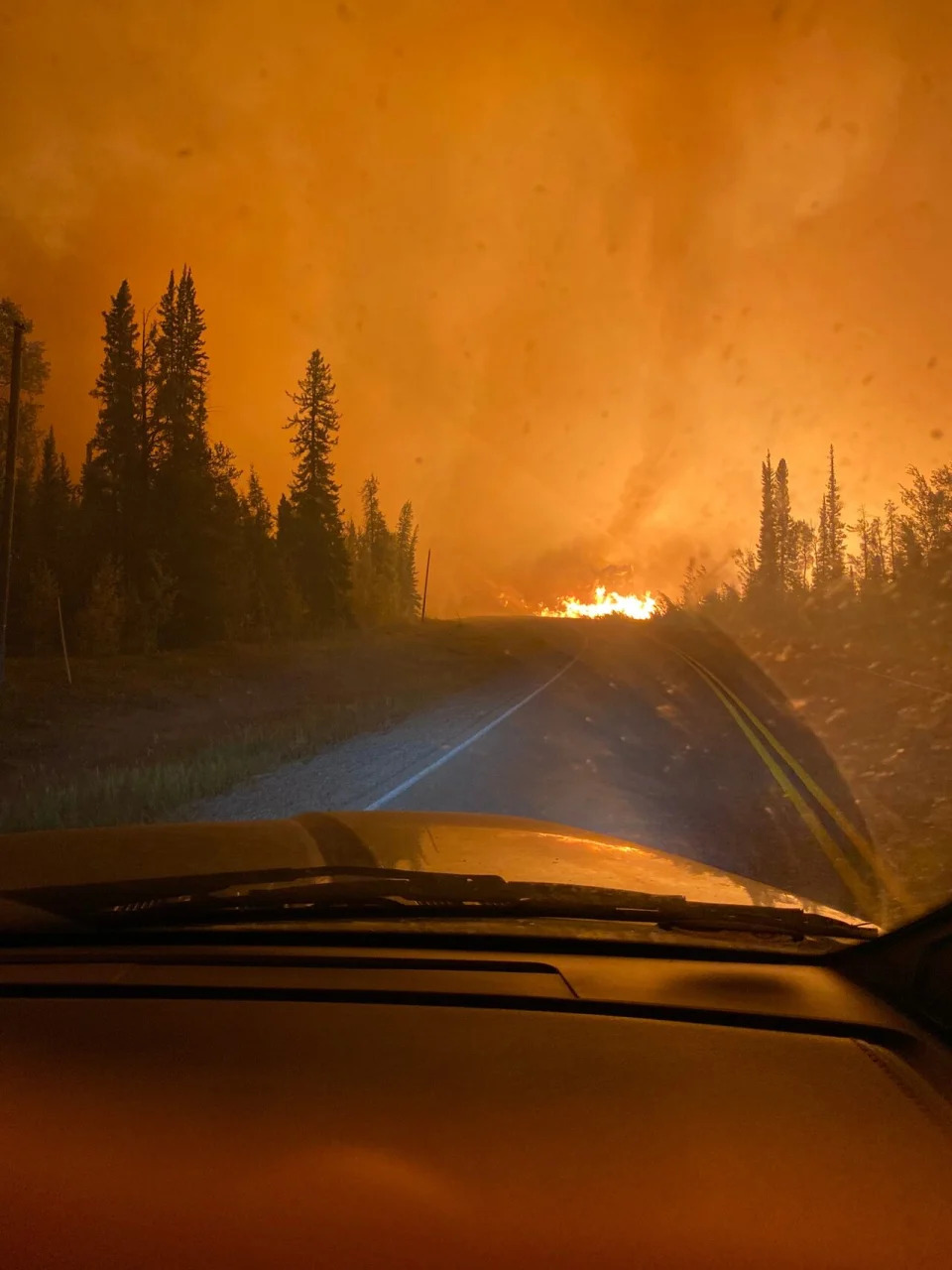
When it's time to evacuate, there's no guarantee the way out will still be safe, Here, Franco Nogarin drove into an ominous orange sky while fleeing fires near Hay River, N.W.T., on Aug. 13, but the first route they chose led them straight into the flames. (Submitted by Franco Nogarin - image credit)
Charlie Kesslar vividly remembers the day he was forced to leave Drayton Valley, Alta., six months ago because of a wildfire.
On the evening of May 4, the town was put under an evacuation order. Kesslar and his wife packed up their belongings, piled into their motor home and tried to make their way out of town.
"It was really difficult because there was so much traffic," Kesslar said.
What should have been about a 25-minute drive out of town to a nearby hamlet ended up taking close to four hours, arriving at 3:30 a.m.
"It was scary not knowing what was going to happen," he said.
Kesslar was one of tens of thousands of Canadians who had to flee their communities this past spring and summer in the worst wildfire season the country has seen in a century.
As of Nov. 2, according to the Canadian Interagency Forest Fire Centre, more than 18 million hectares has been burned — six times more than the 10-year average.
Now, researchers are working on ways to make the evacuation process smoother.
Human behaviour
Stephen Wong, a civil and environmental engineering assistant professor at the University of Alberta in Edmonton, is collaborating with two other researchers to try to improve the evacuation process for residents.
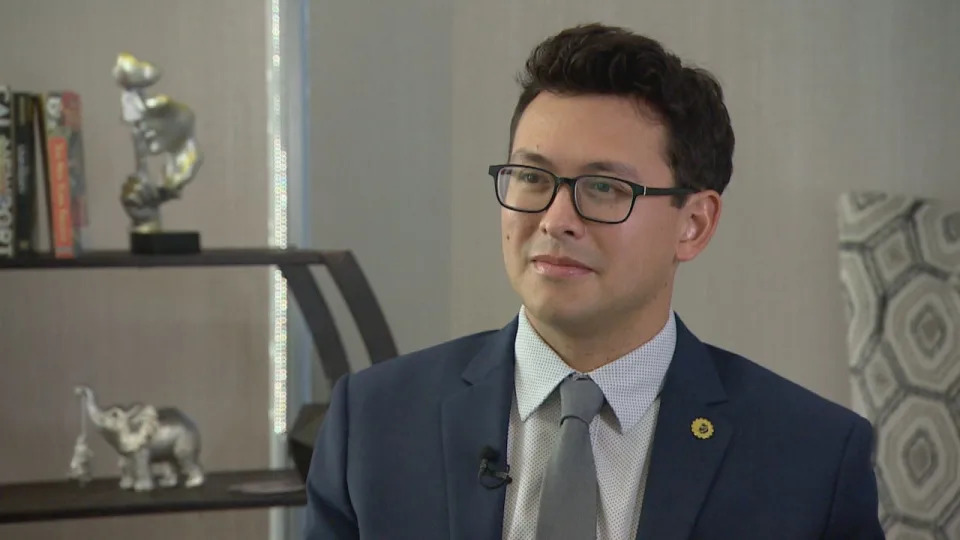
Stephen Wong is an assistant professor in civil and environmental engineering at the University of Alberta in Edmonton. (Richard Marion/CBC)
The trio is looking at five communities — three in B.C. (Quesnel, Salmon Arm and Nelson) and two in Alberta (Whitecourt and Canmore) — and creating evacuation simulation models based on each community's wildfire exposure, human behaviour and traffic simulation.
Wong's focus will be on human behaviour; he is sending out surveys to residents in all five communities to better understand how and what decisions are made by evacuees.
"Such as, will I evacuate or will I stay? But then there's a whole host of other key decisions that are made after that that involve our transportation system," he said.
"That includes the mode of transportation that we use, the route, departure time, where people decide to go and the host communities that might be involved as part of that."
He said the information collected can help figure out whether certain groups need more resources to evacuate, need different methods of communications to encourage them to evacuate or to use certain modes of transportation to leave a community.
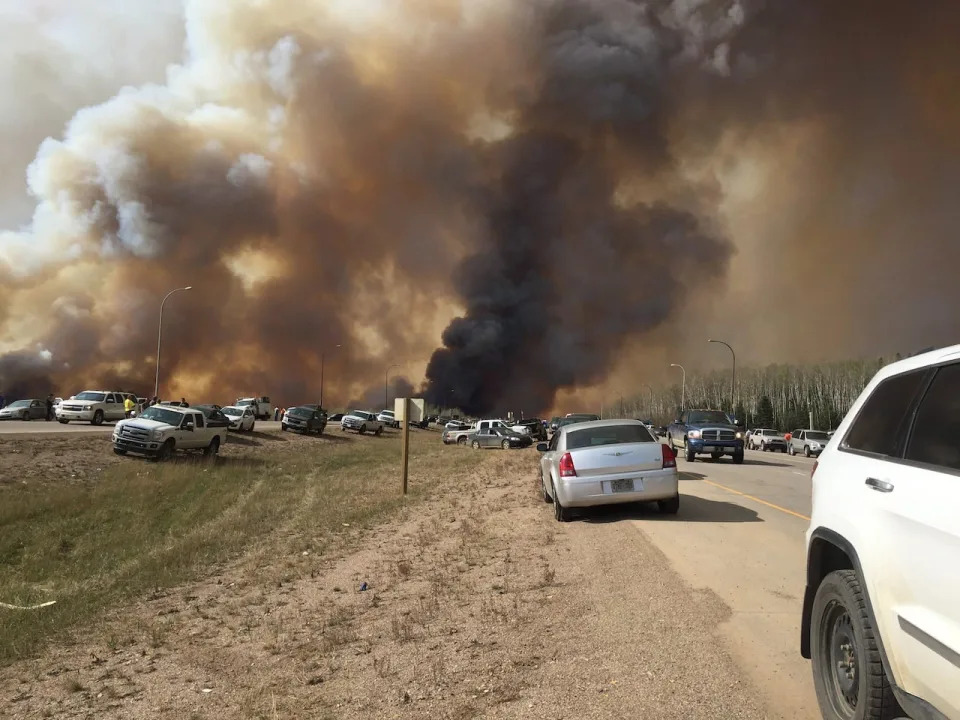
. Fuel shortages are being reported in the evacuation area. There was gridlock oh Highway 63 and some abandoned vehicles as residents fled Fort McMurray, Alta., when a wildfire engulfed the city in May 2016. (Brian Langton/Handout/Canadian Press)
Fire vulnerabilities
Co-researcher Jen Beverly, who studies wildland fire at the University of Alberta, is focusing on the biophysical environment around a community, such as where a fire may ignite and where it may spread.
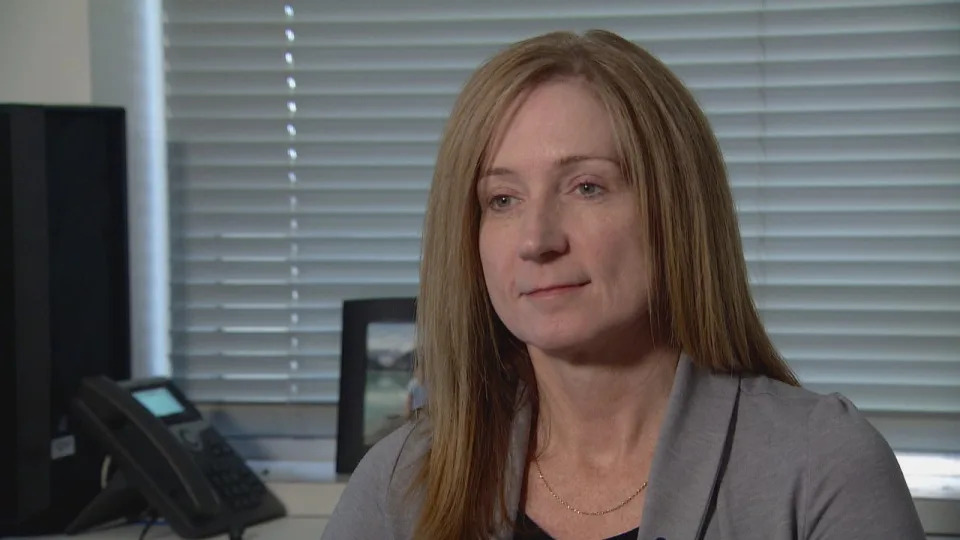
Jen Beverly is an associate professor studying wildland fire at the University of Alberta in Edmonton. (Peter Evans/CBC)
That information is then overlaid onto maps showing the road network.
"If you have a community, for example, with really limited roads out and … one of those escape roads happens to be a key pathway for a fire to move into the community, then you can imagine a scenario where you've got a fire moving into town, it's going to block one of the roads out … It's basically going to create a bottleneck," Beverly said.
The data collected will help create wildfire evacuation models showing how residents might get out of a community, to inform evacuation planning and infrastructure.
"The biggest change that we hope to make in this is informing evacuation plans. A lot of communities, either because of their size or their lack of time to be able to do it, don't have evacuation plans specifically for wildfires," Wong said.
The project will also look at how the built infrastructure and transportation system could change to help wildfire evacuations and other disasters.
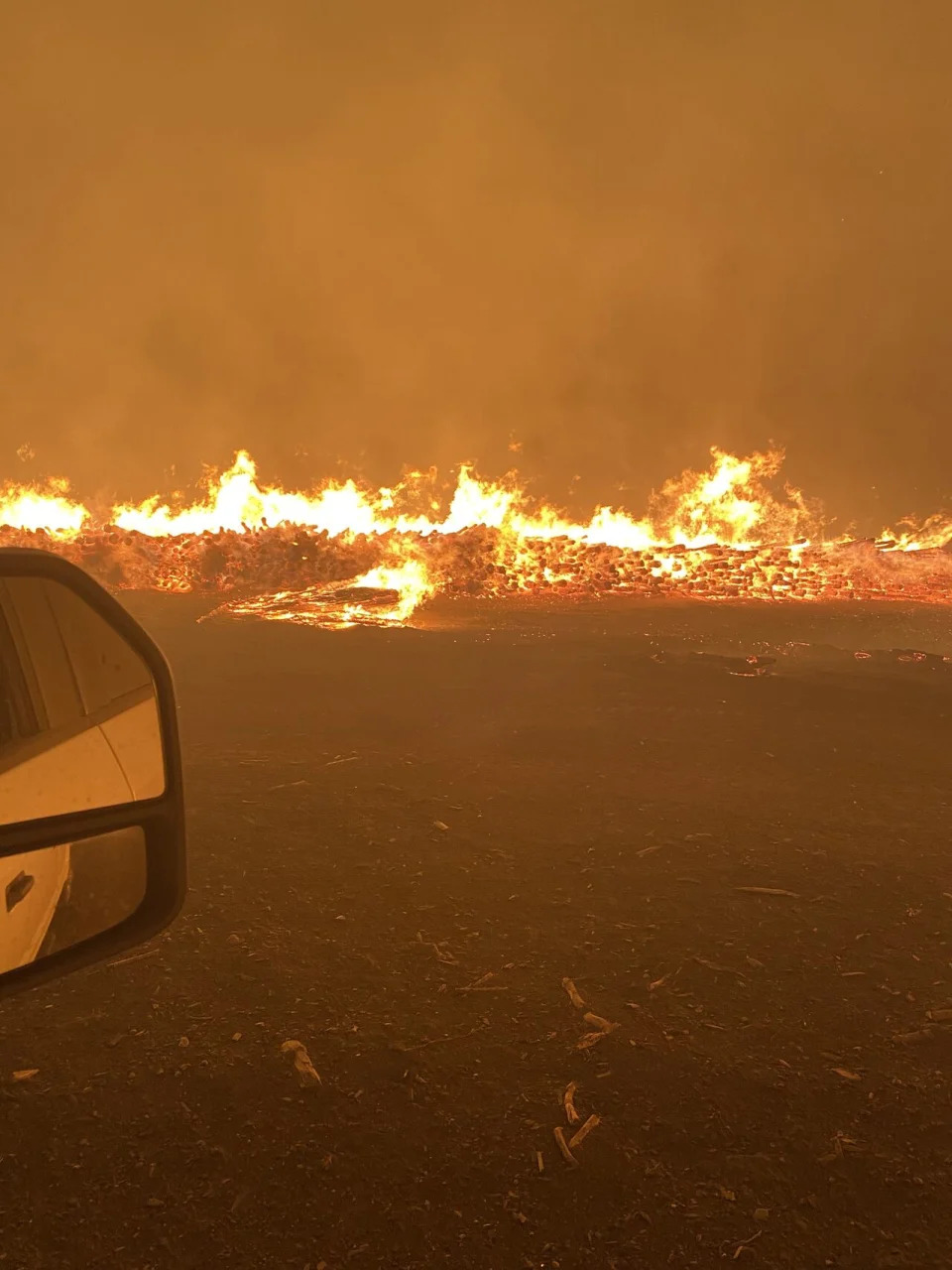
Piles of logs on fire at the Patterson sawmill near Hay River, N.W.T., as wildfire moves through the area, Aug. 13. (Sandra Lester)
Fire can happen anywhere
The research started last year and was slightly paused during the 2023 wildfire season to ensure field partners could focus on the real-time wildfire response.
Beverly said the research is important considering what Canadians saw in the spring and summer.
"Fires can happen in places where maybe we haven't had a lot of fire and don't expect it to happen," she said. "What we've learned from this past season is that fire can happen there.
"If there's fuel and we're living in an uncertain climate situation, it's possible that any region of the country could experience extended drought, and we saw that in 2023, and when that happens, any fuel can burn."
The project is expected to be complete by early 2025.
Nunavut review board says Rankin Inlet mine expansion should not go forward
CBC
Mon, November 20, 2023
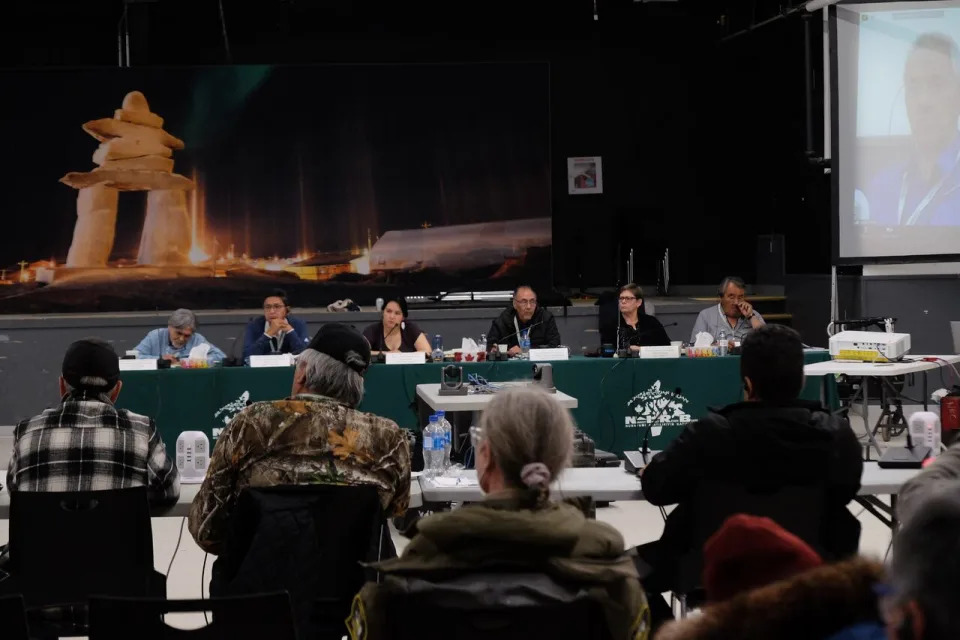
The Nunavut Impact Review Board holds public hearings in Rankin Inlet, Nunavut, into Agnico Eagle's proposed expansion of its Meliadine gold mine. (Emma Tranter/CBC - image credit)
The Nunavut Impact Review Board (NIRB) says a proposal to extend Agnico Eagle's Meliadine gold mine should not be allowed to proceed.
Agnico Eagle's proposal would have extended the mine's life by 11 years, to 2043, and built an 11-turbine wind farm to power the mine.
In a 255-page document released late Friday, the NIRB said the mine, which opened in 2015 and is 25 kilometres from Rankin Inlet, should not expand at this time, "due to the considerable uncertainty of the potential for the proposal to have negative, lasting effects on caribou, and the uncertainty of cumulative effects."
In a statement to CBC, Agnico Eagle said it is "surprised and disappointed" by the recommendation.
"On first reading, it appears that the scientific studies submitted to the NIRB regarding the impacts of the project have not received all the consideration they deserve in several respects," said Agnico Eagle spokesperson Natalie Frackleton.
"We will take the time to fully review and understand the NIRB's recommendation report and assess our next steps before making any further comments."
Frackleton also said the extension would have created additional job opportunities and continued "Agnico's 15-year history of environmental commitments in the region."
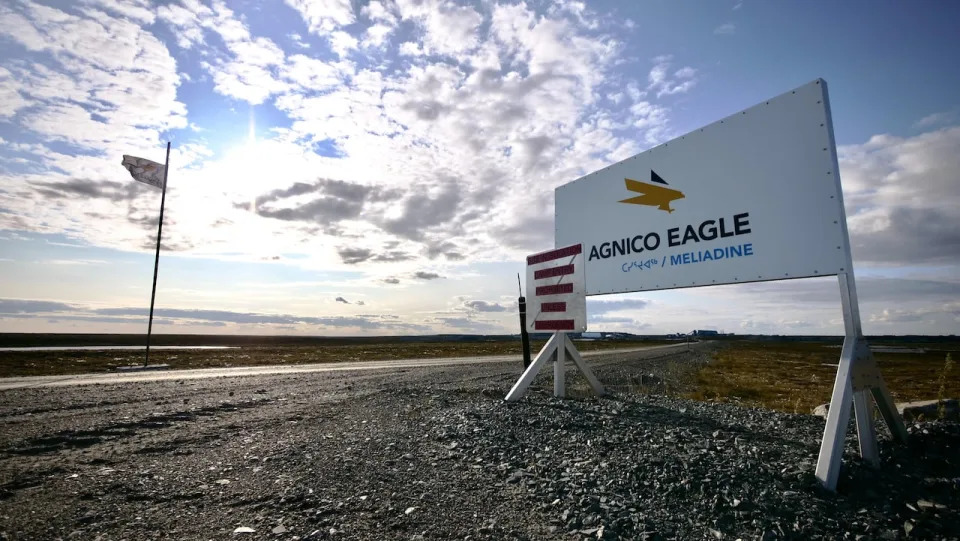
The sign on the all-weather access road to Agnico Eagle's Meliadine Mine near Rankin Inlet.
The sign on the all-weather access road to Agnico Eagle's Meliadine Mine near Rankin Inlet. The Nunavut Impact Review Board has decided that Agnico Eagle's proposal to extend its Meliadine gold mine should be allowed to proceed. The decision comes after nearly a year and a half of assessing the proposed expansion. (Matisse Harvey/Radio-Canada)
The board's assessment began in April 2022 and ended with an eight-day hearing in Rankin Inlet in September 2023.
Uncertain 'scope of effects'
That hearing was dominated by community concerns about the mine's impacts on caribou.
"The board noted high levels of uncertainty as to whether existing or modified mitigation measures would be sufficiently protective to prevent or manage negative effects from the extension proposal on caribou; especially when considering critical calving and post-calving periods," the board wrote.
The board noted in its decision that while there is too much uncertainty around the current proposal, it encouraged Agnico to resubmit in the future.
"The additional experience and monitoring results may create a clearer picture of the abundance, health and movement of caribou near the mine," the board wrote.
It also noted that there is much support throughout the Kivalliq region for the mine.
"While the Board recognizes the support in the Kivalliq communities for the economic benefits that the Extension Proposal represents, the Board has identified that there is considerable uncertainty in relation to the scale and scope of effects," NIRB wrote.
The final public hearing also heard concerns about the water quality in Meliadine Lake and its downstream rivers and "the current level of discharges from the approved project of surface contact water, treated sewage and saline groundwater into Meliadine Lake."
The company's proposed location for the wind farm, which was near the mine site, also faced widespread criticism from every intervenor at the hearing over concerns about its impacts on caribou.
On the hearing's final day, Agnico Eagle changed its position, saying it would not build the wind farm in the originally proposed location and would instead work with the Kivalliq Inuit Association to find a suitable location.
Throughout the hearing, Agnico Eagle received pushback from Inuit organizations, the Government of Nunavut and the Rankin Inlet Hunters and Trappers Organization as well as members of the public over the proposed location for the wind farm, because of its proximity to caribou calving grounds.
Federal Northern Affairs Minister Daniel Vandal has the final say on the mine's proposal. He has 90-180 days from the date of NIRB's decision to either accept or reject it.
Receiver needs more money to complete sale of abandoned Minto Mine in Yukon
CBC
Fri, November 17, 2023

An aerial view of the Minto mine site in the Yukon in July 2023. The mine's previous owner, Minto Metals Corp., suddenly pulled up stakes in May. The Yukon government then took over managing the site which is now for sale. (Government of Yukon - image credit)
The firm that's managing the sale of the abandoned Minto Mine in the Yukon wants more money to finish the job as dozens of potential buyers have expressed interest.
That's according to court documents recently filed this month by PricewaterhouseCooper (PwC).
The Yukon Supreme Court appointed the firm to manage the mine's affairs, including selling the property, after the now-defunct Minto Metals Corp. abandoned the site in May. The receiver had initially borrowed half a million dollars to manage the property, which is located on Selkirk First Nation's land, approximately 240 kilometres north of Whitehorse.
The receiver's first report to the Yukon court reveals that it needs more money to carry out the sale.
PwC is asking the court to sign off on an additional $500,000 from Maynbridge Capital, a company that provides loans, to fund Minto's receivership.
"Without an increase in the Receiver's Borrowings Charge, the Receiver will be unable to carry out its duties under the Receivership Order," the report reads.
The report states the borrowed money will be repaid once the mine is sold or through the liquidation of assets.
Yukon Department of Energy, Mines and Resources spokesperson John Thompson wrote in an email to CBC News that the receiver's request to borrow more money doesn't affect the Yukon government, which took control of the mine site after Minto Metals Corp. pulled out.
"The Yukon government is not providing money to PwC," Thompson said. "The receiver will be paid with funds from the proceeds of the mine sale."
Meanwhile, the government continues to pay for water treatment and other environmental protection activities at the site. Thompson says the government has spent $13.3 million to date on contracts at Minto Mine since the site was abandoned.
WAGE THEFT
Quebec BRP plant pleads guilty to 41 workplace violations
CBC
Fri, November 17, 2023

BRP has pleaded guilty to 41 workplace violations related to underpaying Mexican workers. (Graham Hughes/La Presse canadienne - image credit)
Quebec-based company Bombardier Recreational Products (BRP) pleaded guilty to 41 offences at the Granby courthouse on Friday after being accused of underpaying migrant workers.
Quebec's workplace safety board — the Commission des normes, de l'équité, de la santé et de la sécurité du travail (CNESST) — withdrew 35 of 76 statements of offence it had previously issued the company.
The two parties reached a common agreement, lawyers for both sides explained to the court, avoiding a trial.
Last February, Radio-Canada exposed the differential treatment of Mexican workers at BRP's Valcourt plant in Quebec's Eastern Townships. At the time, the company stated that it deducted approximately 60 per cent of Mexican workers' wages to cover accommodations and other costs.
BRP admits it did not issue pay stubs to certain Mexican workers and it did not keep a register of workers. The company also acknowledges that it did not pay overtime in accordance with Quebec standards.
The CNESST's lawyer explained to the court that the company had been co-operative in this case. He requested the minimum penalty of $600 per statement of offence.
Minimum wage offence dropped
The CNESST withdrew the statements of offence for non-compliance with the legal minimum wage, as well as 10 other statements of offence for failure to issue pay slips.
According to Université de Sherbrooke law professor Finn Makela, the CNESST's decision to withdraw the 25 statements of offence for non-compliance with the minimum wage doesn't necessarily mean that the government agency has vindicated BRP.
"We can't conclude that they've been cleared, but at the same time, the presumption of innocence has been restored," he said.
He said it can be strategic to drop certain charges during negotiations to obtain an admission of guilt on other points.
Michel Pilon, director of a group that advocates for temporary foreign workers, the Réseau d'aide aux travailleuses et travailleurs migrants agricoles du Québec (RATTMAQ), says "the CNESST was right to file these penal complaints. They [BRP] were found guilty in these criminal complaints. There's still the civil file, since a criminal complaint doesn't reimburse workers, but the civil claim does."
BRP representatives said in an email they were "very pleased with the CNESST's decision to withdraw all the statements of offence relating to the minimum wage."
"We have always been convinced that we have paid our Mexican employees fairly and equitably," it said in a statement.
The company claims the other violations were due to "certain administrative errors" between the payroll systems of BRP's plants in Mexico and Valcourt.
"We have already rectified the situation and paid the amounts due to our affected employees," says the company.
Staff at A&W in Kamloops, B.C., unionize in what organizers say is a first in Canada
CBC
Mon, November 20, 2023

Workers at a Kamloops A&W location have unionized, with an organizer saying that they are looking for clarity on the benefits provided to employees. (A&W Food Services of Canada Inc. - image credit)
A group of workers in Kamloops, B.C., are believed to be the first staff at a Canadian A&W restaurant to successfully unionize.
Thirteen people who work at the Valleyview location signed union cards and were certified with the B.C. Labour Relations Board on Friday, according to Local 993 of the International Brotherhood of Electrical Workers (IBEW).
Brian Andrews, an organizer for Local 993, says the workers have issues with how the managers are treating them and they are looking for clarity and consistency when it comes to the discounts they receive on A&W meals during their shifts.
"Management aren't trained correctly on actual management issues, and when they come in to work they treat their employees with disrespect ... by yelling and screaming and demanding and ordering them around," he said.

Brian Andrews of Local 993 of the International Brotherhood of Electrical Workers told CBC News that even though workers at a Kamloops, B.C., A&W restaurant aren't electricians like the majority of the IBEW's members, the union took the group on because they wanted to see them succeed.
Brian Andrews of Local 993 of the International Brotherhood of Electrical Workers told CBC News that the union took the A&W employees on because they wanted to see them succeed. (Jenifer Norwell/CBC)
Andrews said an employee found the IBEW online and contacted them, saying they liked the benefits that the union had secured for its other non-electrician members through collective agreements.
CBC News has contacted A&W Canada for comment.
The burger chain is headquartered in North Vancouver, B.C., with its website saying there are over 1,000 locations across Canada.
Andrews says the union took the group on because they wanted to see them succeed.
"Working with a major company like A&W, they're known to be anti-union and so we kind of just have to run with it," he said.
"We said, 'we should just jump on this and get them unionized as quick as possible.'"
Twenty people were employed at the restaurant at the time of certification, but Andrews said the number of workers employed during the card-signing drive fluctuated because of a high staff turnover rate at the restaurant.
N.L.'s K-12 teachers will vote on proposed collective agreement early next month
CBC
Fri, November 17, 2023

Trent Langdon is the president of the Newfoundland and Labrador Teachers' Association. (Jeremy Eaton/CBC - image credit)
Newfoundland and Labrador Teachers' Association president Trent Langdon says teachers will get to go over the details of a tentative agreement over the next few weeks. (Jeremy Eaton/CBC)
Teachers in Newfoundland and Labrador are close to having a new collective agreement, with their union reaching a tentative deal with the provincial government and school boards association.
On Friday afternoon, Newfoundland and Labrador Teachers' Association president Trent Langdon said K-12 teachers will get to go over the details of the tentative agreement over the next few weeks.
"We look forward to the possible ratification of an agreement which will allow us to continue to concentrate on providing outstanding education to the students of this province," Langdon said in a statement.
In the statement the NLTA also said no more information will be shared publicly until teachers have a chance to see the contents.
Members will get to have their say by voting electronically Dec. 5-7. After voting ends it will be announced if enough members voted to ratify the agreement.
The last agreement was ratified in March 2019 and extended in 2020.
The NLTA represents approximately 6,500 educators and administrators in the province.
In a statement, Deputy Premier Siobhan Coady thanked the association for "engaging in respectful negotiations," which called a testament to their "good working relationship."
Nova Scotia paramedics agree to 3-year contract
CBC
Sat, November 18, 2023

Members of the union representing Nova Scotia paramedics have agreed to a new three-year contract. (EHS - image credit)
Members of the union representing Nova Scotia paramedics have approved a new three-year contract, according to a news release from the provincial government.
The agreement with the International Union of Operating Engineers Local 727 covers the period Nov. 1, 2023 to Oct. 31, 2026.
The contract provides for a 16.5 per cent adjustment for workers transferred to another job classification or performing the function of another role.
Cost of living increases totalling 8.5 per cent over three years are part of the agreement, the release says.
The agreement also provides for a retention allowance of $5,000 a year for paramedics in permanent or term positions.
Additionally, the contract includes a salary increase for clinical transport operators, and resources to support them being trained as primary care paramedics.




























